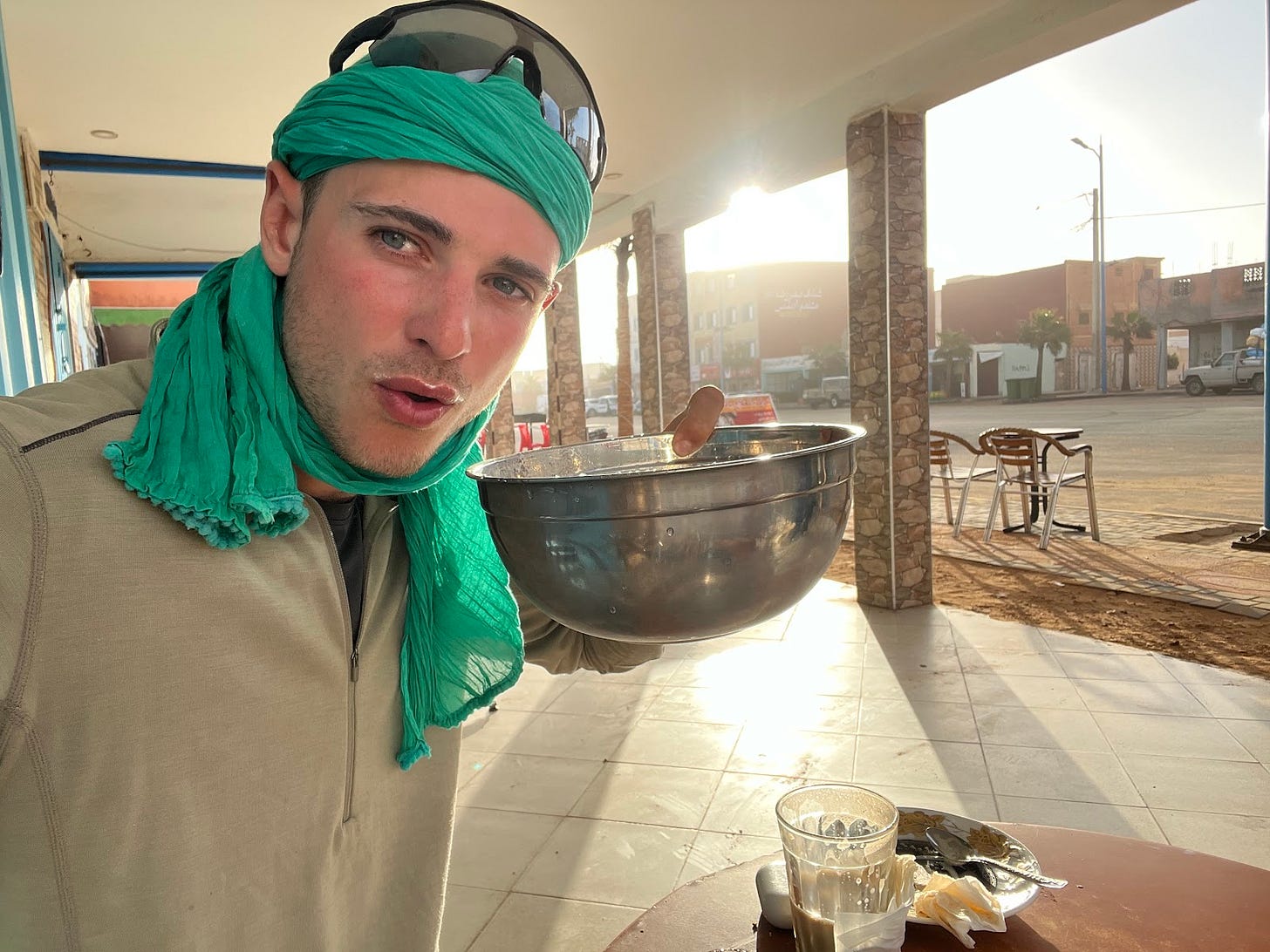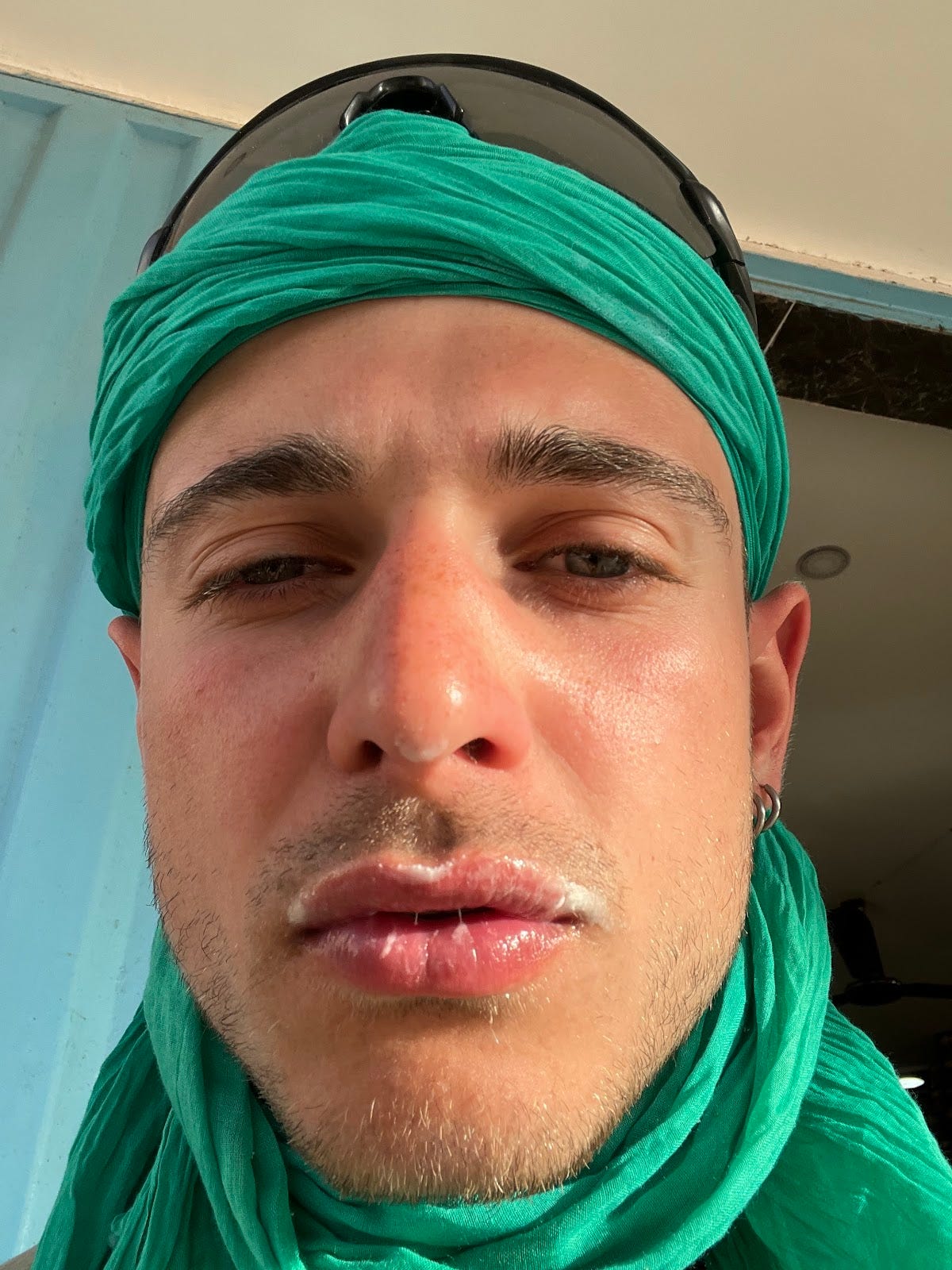Spoke 11: The Hero's Quest
Jake Thorpe wonders about the real motivation behind a very long bike ride whilst drinking lots of camel's milk
A spoke is a little metal rod connecting the centre of a wheel to its outer edge. There are 32 such spokes in the rims of my Brother Mehteh.
A Spoke is a guest writer on 10,000km Arriba. One day I will publish a collection of Spokes: 32 voices, 32 stories.
Jake Thorpe, a transcontinental rider, is the 11th Spoke to be featured.
Have you heard of the Hardest Geezer? This is, without a doubt, the most common question I’m asked when people discover where I am and what I’m doing. My invariable answer to this invariable question is yes, but for those for whom it isn’t, let me enlighten you. Russ Cook – the self-styled Hardest Geezer – is a British man currently running the length of Africa who has, at the time of writing, run for 304 days, covered 13,270 kilometres, and raised over £180,000 for charity in the process. I, on the other hand, am a British man currently cycling (most of-) the length of Africa and have, at the time of writing, covered a little under 5,000 kilometres, taken 3 holidays along the way, and even enjoyed a brief hiatus in the form of a family Christmas at home. I think you can agree, in the eternal words of Jules Winfield, that this ain’t the same ballpark, it ain’t the same league, it ain’t even the same fuckin’ sport. Literally. But this doesn’t stop the comparisons rolling in. And each time they do, I laugh it off, rattle off some attempt at humorous deflection, and leave feeling a little deflated about the scale of my own adventure.

Now, a feat like Russ’ is of such a monumentally different scale to mine that these comparisons don’t tend to cut too deep. But sometimes things come closer to home. Last year, I let a friend from university in on my embryonic plan to cycle from London to Cape Town. No way! he said. I’ve got another friend who’s just set off to do the same thing! Now, this was a bit more of a kick in the egoic teeth. As it turned out, this friend of his was also 24; he happened to study the same subject as I did at the very university – in fact, the very college – that I’d suffered a bitter rejection from at the sensitive age of 17; and he’d had a three month head start. Same sport; same league; same ballpark. It was difficult not to let this revelation dilute my excitement for the adventure ahead.

At this point, perhaps some background might be useful. From as young as I can remember, I’ve always had a strong desire to swim against the current. This has presented itself in various ways over time. In my early years, I’d regularly borrow my older sister’s clothes and dress in them (quite literally) from the bottom up to become my alter-ego, Rosie. In my early teens, I made a concerted effort to rebel; sex, drugs and questionable tattoos took precedence. Then, in my late teens, when putting any effort into school work was considered social insanity, I affected a monkish resolve, knuckling down on the academic front and even announcing sobriety on occasion – with varying levels of success – while my peers were on a more naturally-timed rebellious trajectory. After university, I broke free from the shackles of a predetermined career in banking – the natural continuation of a degree in Economics – to enter the start-up world, taking home a (bottom-heavy) fraction of the salary my city-slicker friends commanded. That brings us to now, where I’ve decided to hang my career out to dry while I take to the road in search of adventure.

I’ve indulged in this selective autobiography to illustrate a point. And that point is motivation. Where does it come from? Why do we do what we do? After plenty of reflection during long hours in the saddle, I’ve discovered that my own motivation can often be reaction. I mean this in both senses; reacting against the status quo, and the reaction you receive as a result. It feels exposing to put this in black and white, but if I’m being truly honest with myself, I draw a certain sense of pride from bucking a trend. When I think about it, even the route I’m taking was motivated by a reaction to something external. Why Africa? I’m often asked. Well, a year-or-so back, a very close friend of mine also happened to set off on a multi-month bike tour. He decided to cycle from the door and, with another friend, covered 15,000km from London to Almaty, following the West-East axis. So, early last year, when I too decided that I’d like to take a multi-month bike tour, cycling from the door, my choice of route was ultimately a reaction to his. West-East was taken. That left North-South. From London, to cover the distance I had in mind, North-South meant Africa. So, as you can imagine, discovering this wasn’t such a unique idea after all came as a slightly unwelcome surprise.

You might already be aware of the difference between intrinsic and extrinsic motivation. Intrinsic motivation is a drive that comes from within, whereas extrinsic motivation is drawn from someone, somewhere, or something else. For a long time I’ve sensed that intrinsic motivation is the ideal; a pure, distilled energy that wells up and remains untempered by anything or anyone around you. Extrinsic motivation, on the other hand, feels more fickle; it’s subject to factors that lie beyond your control, and seems to ebb and flow accordingly. I tend to sit pretty firmly on this side of the fence.
It’s funny how we often focus on what we want, glossing over the more interesting question of why we want it. Sometimes, peeling back that extra layer can be uncomfortably revealing. As I’ve been pedalling, I’ve been peeling. And I’ve landed on an interesting question. Would I still do this ride if no-one knew about it? In essence: how intrinsic is my motivation? For a while, the answer remained beyond my grasp. Instead, I was left with more questions. I’ve chosen to write a blog as I travel, which means I’m making a concerted effort to make people aware of what I’m doing. Is this choice performative? Is the trip itself the motivator, or is it all just in aid of having something to say? Questions on questions on questions.
Luckily, in an existential pinch, I have my Grandma to look out for me. A day or two back, she emailed over something she’d read about The Hero’s Quest. The language is grandiose, I know, and I don’t intend to adopt any heroic implications about my own trip. Instead, the hero’s quest is used to cover any manner of personal adventure, big or small. The piece first paints the traditional image of a hero’s quest; one that’s found in countless forms in classical mythology. Typically, a challenger journeys to find a new life-affirming perspective and (crucially) returns renewed with energy, ready to share the wisdom they’ve discovered with others. The piece goes on to explain how today, this picture has morphed beyond recognition; the focus of the hero’s quest has transposed from the external to the internal.
Interestingly enough, this classic tradition of a true “hero” is not our present understanding at all. There is little social matrix to our present use of the word. A “hero” now is largely about being bold, attractive, rich, famous, talented, or “fantastic” by oneself, and often for oneself, whereas the classic hero is the one who “goes the distance,” whatever that takes, and then has plenty left over for others. True heroism serves the common good or it is not really heroism at all.
As I’ve pondered the idea of the traditional hero’s quest, I’ve come to realise that often the motivation to undertake an adventure is less important than the impact that the journey has on you and, more importantly, on those around you. By this logic, the whole point of setting off on an adventure is to share what you learn with others; to take an external focus, rather than hoarding the experience for yourself. Suddenly, the idea of extrinsic motivation doesn’t sound so bad; and whether or not the adventure is record-breaking, earth-shattering, or even particularly novel pails into insignificance.


I hope that by sharing my experiences from the road, I might encourage other people to have a crack at their own quest. And I hope that the scale (or similarity) of other people’s adventures doesn’t undermine the significance of our own. Using Dogberry’s wisdom: comparisons are odorous. I’m still working to understand the why of my own adventure. But really, it seems that the most important thing is what you learn and how you use it. Is the impact personal and private, or does it flow over, rippling out to resource the world that we’re part of? This feels like a question worth asking. So, as you sit and dream about your next adventure – whether it’s trailblazing or following a well-worn path, whether big or small – I hope that you’ll let this question percolate. Go on your quests; learn what you can; and, most importantly, share what you learn with the world.

About the author:
Jake has recently given up his dream job as Head of Sport (whatever that means) at TENZING Natural Energy, to pursue the far less lucrative career of unpaid writer and unprofessional cyclist.
His writing has been heralded as pompous tosh and perhaps the single most self-indulgent self-reflection since Narcissus’ pond incident (he imagines), but it is largely enjoyed by his mother and receives mostly positive feedback on the family group chat.
He is currently on a farcical adventure from London to Cape Town – mostly by bike, sometimes by plane – during which he hopes to polish his rusty A-Level French, and learn all four vocal parts of Carmina Burana.
When he’s not on a multi-month bike tour, Jake is a keen climber, aspiring yogi, and finds sitting down altogether more comfortable.
His girlfriend, Ellie, would like to have it on record that she’d rather he took a pause from the so-called hero’s quests for a while once he reaches Cape Town, for the sake of their relationship. While he’s gone, he has been replaced by a Jellycat Frog – Flumpie – who she says is a markedly better bedfellow.
You can stay up to date with Jake’s African adventure on Substack. He posts to The Magical & The Mundane: A (Mostly) Solo Bike Tour weekly.
To follow Jake’s journey subscribe here.
If you enjoyed this piece, please consider subscribing to 10,000km Arriba. You will find a new Spoke in your inbox every two weeks. You’ll also get regular updates from me as I retell the Patagonia-Colombia journey over the next few months.
Not too many updates, not too little, but just enough to make you want to sell everything you own and hit the road.
Guest writers you may have missed
Spoke 5: Retracing my great-grandfather's final flight on two wheels
Part of Guest Writers Season 1 Post 5/6 For most of my conscious life, time spent on two wheels has closely competed with time spent on two feet. Pre-school opened the door to trike racing with Tom, a cycle companion I ride with regularly to this day. At secondary school things started to get more serious, with all free time dominated by mountain biking. …
Spoke 10: Heart of Light - pedalling into Africa
A spoke is a little metal rod connecting the centre of a wheel to its outer edge. There are 32 such spokes in the rims of my Brother Mehteh. A Spoke is a guest writer on 10,000km Arriba. One day I will publish a collection of Spokes: 32 voices, 32 stories.
A call for writers
If you’d like to guest write on 10,000km Arriba, you’d be most welcome.
You can write about any bike experience, whether a short or long trip, a chronic cycling addiction, or simply a moment on two wheels that you deeply cherish.
Let me know in the comments or send me a message.
The story so far
Chapter 1 | Chapter 2 | Chapter 3 | Chapter 4 | Chapter 5 | Chapter 6 | Chapter 7 | Chapter 8
Podcast appearances: 10Adventures | Seek Travel Ride










pretty sureal stuff